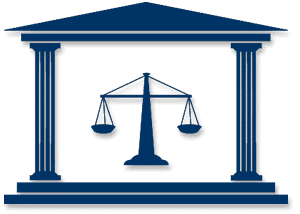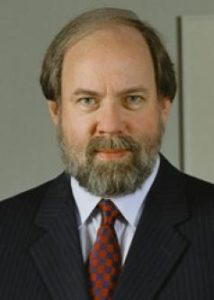
7th Circuit Upsets Settled Thinking On Bankruptcy, Foreclosure Interplay
Sharp  Thinking
Thinking
No. 165 Perspectives on Developments in the Law from Sharp-Hundley, P.C. March 2019
7th Circuit Upsets Settled Thinking
On Bankruptcy, Foreclosure Interplay
By John T. Hundley, 618-242-0200, john@sharp-hundley.com
Seemingly settled practice regarding the interplay of bankruptcy and foreclosure law was turned on its head late last month when the U.S. Court of Appeals for the Seventh Circuit held that a state court in a foreclosure case has jurisdiction and authority to enter a deficiency judgment against a debtor with a pending bankruptcy.

Hundley
Moreover, the Seventh Circuit seemed to say that that was the case regardless of what the bankruptcy judge may have said in granting relief from the bankruptcy stay.
In In re Anderson, __ F.3d __, 2019 WL 922586 (7th Cir. 2019), one of two joint debtors filed bankruptcy after the lending bank commenced foreclosure with a complaint that sought a deficiency judgment and also included a count based on the note. The bank then sought and obtained relief from the automatic stay, the bankruptcy court granting “full and complete relief from the [a]utomatic [s]tay of [11 U.S.C.] Section 362 to permit [bank] to proceed with the pending State Court foreclosure litigation with respect to the property commonly known as [address]”.
The bank then prosecuted the foreclosure case to judgment, sale and confirmation, taking a deficiency judgment against the non-bankrupt debtor but not against the bankrupt. It then made a claim in the bankruptcy court for the deficiency amount against the bankrupt debtor. The debtor responded that such a claim was barred under the doctrine of claim preclusion. The bankruptcy judge rejected the argument but the district court agreed. The bank then appealed to the Seventh Circuit.

Easterbrook
The court noted the parties focused on whether the bankruptcy court order authorized the state court to enter a judgment against the bankrupt personally, and discussed claim preclusion as a secondary issue. It said this was “backward” because the “effect of a state court’s decision depends on state law” and state court judgments are to be granted full faith and credit by federal courts under 28 U.S.C. § 1738.
Therefore, wrote Circuit Judge Frank H. Easterbrook, the issue was whether the bank could file a new lawsuit in Illinois courts. Seeming to find a conflict among Illinois Appellate Court panels on whether a party that brings a foreclosure case without also seeking a deficiency judgment could later sue on the note, Easterbrook said that that alleged conflict did not have to be resolved “because all of the state’s authorities agree that, if a litigant presents both the mortgage and the note in a single action, and fails to seek a deficiency judgment on the note, it cannot do so in a separate suit.” (The court cited no case in support of that sentence.)
But, the bank argued, the automatic stay deprived the state court of jurisdiction to make any decision except as permitted by the bankruptcy judge in the lift-stay order. Easterbrook rejected this argument because the statute imposing the stay (11 U.S.C. § 362) “does not concern jurisdiction.” He suggested a state court has the power to hold a foreclosure suit “open to allow deficiency-judgment proceedings after the bankruptcy end[s].”
The parties disputed the meaning of the bankruptcy judge’s lift-stay order – the debtor emphasizing the “full and complete” language while the bank focused on the “with respect to the property” clause – but Easterbrook said it was “unnecessary to determine the meaning” of that order.
“Allowing the state judiciary to enter a deficiency judgment in a foreclosure proceeding does not undermine any function of bankruptcy law,” he stated. He said interpreting the lift-stay order as the bank argued would “compel the sort of claim splitting forbidden by state law.”
Anderson can be criticized on the ground that its views on  Illinois law on claim-splitting are unreliably documented. Two key sentences – one noted above, the second being summarized in the immediately preceding paragraph – cite no cases at all, and a longer discussion elsewhere is based solely on Illinois Appellate Court cases. The Illinois Supreme Court has said Appellate Court opinions are not binding on other appellate panels. O’Casek v. Children’s Home & Aid Soc., 892 N.E.2d 994, 1006-07 (Ill. 2008).
Illinois law on claim-splitting are unreliably documented. Two key sentences – one noted above, the second being summarized in the immediately preceding paragraph – cite no cases at all, and a longer discussion elsewhere is based solely on Illinois Appellate Court cases. The Illinois Supreme Court has said Appellate Court opinions are not binding on other appellate panels. O’Casek v. Children’s Home & Aid Soc., 892 N.E.2d 994, 1006-07 (Ill. 2008).
Moreover, Anderson can be criticized as pursuing the Seventh Circuit’s interest in claim preclusion at the expense of respect for bankruptcy courts. “[B]ankruptcy judges lack the salary and tenure protections of Article III [of the U.S. Constitution], which means that they cannot exercise the same powers as district judges over disputes arising under state law,” the court wrote in what seemed to be an unnecessary swipe. It does not follow that their limited  authority – and their decisions – are not to be respected. Anderson is a case in which the creditor appears to have given the bankruptcy court more respect than the Court of Appeals does.
authority – and their decisions – are not to be respected. Anderson is a case in which the creditor appears to have given the bankruptcy court more respect than the Court of Appeals does.
Nonetheless, Anderson’s result is not necessarily wrong. Bankruptcy courts often give relief for state-court proceedings to determine not only the fact of liability but also the extent of damages. Arguably that is the result here. But ordinarily in those situations the lift-stay order is examined to determine what the state court is permitted to do. It was just such an order in Anderson that the court says is immaterial.
Ordinarily when a panel of the Seventh Circuit issues such a dubious opinion we would say that one should look for a petition for rehearing by the full court. However, because of questions about appellate jurisdiction that are not germane to this article, Anderson states that it already has been circulated to the full court and no judges favored a hearing by the full court. So, unless review is sought and granted by the U.S. Supreme Court, Anderson looks to be the law governing these matters in this circuit.
That means that creditors’ rights attorneys need to familiarize themselves with the decision pronto. Effective immediately, in cases where the bankrupt has assets or income that may be available for unsecured creditors, creditors’ counsel need to convince both bankruptcy and foreclosure courts that Anderson means that the foreclosure courts can and should enter deficiency judgments against bankrupts. And it likely means that, where possible, counsel should go back before foreclosure courts to have deficiencies entered in cases where that relief was not sought under the belief that it could not be.
SHARP-HUNDLEY, P.C.
1115 Harrison, Mt. Vernon, IL 62864 • Telephone 618-242-0200 • Facsimile 618-242-1170 • www.sharp-hundley.com
165
